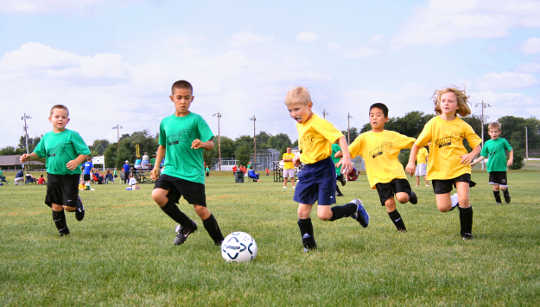
Anyone who has recently been to a youth athletic event can testify that it has become more parent-centric over the years. For what it’s worth, one of the more astonishing statistics circulating in youth sports circles is that there are 33 million kids in athletics today between the ages of five and seventeen. Yet by the age of thirteen, 75 percent of kids drop out of organized sports.
While there are several reasons for this mass exodus, a major cause happens to be “over the top” parents, whose involvement, expectations, and pressure to excel drive kids to quit. How crazy is this?
Unfortunately, such unintentional negative interference by parents can cause children to abandon a healthy activity, one that often leads youth away from drug and alcohol abuse, criminal involvement, teen pregnancy, and a host of other deleterious activities.
Many young athletes become mentally, emotionally, and spiritually fried by the constant competitive pressure, which includes the overwhelming obsession to win, to gain external recognition, to attain perfection, to fulfill unrealistic expectations, and to measure self-worth solely by results and outcomes. Further, overzealous parents can become seduced by the possibility of their daughter or son getting on an athletic scholarship track and catching the next train to Stanford.
I have talked with parents who are frantic and fearful about their kid’s future, and many see sports as their child’s ticket to success. Yet the statistical chances of a kid getting a college athletic scholarship are very small.
Bad Parenting?
Parents can also buy in to the notion that if they don’t intervene and involve themselves in their kid’s game, they are bad parents, letting their little stars down. If they don’t get involved, they feel guilty, scared, and empty. If their kids get cut, quit the team, or perform poorly, the parents feel that it’s their fault. If kids don’t recover emotionally from failure in sports, either quickly or well, parents can feel responsible for this, too.
Of course, no one is a bad parent for wanting their kid to get into Stanford, and we aren’t wrong to want our kids to be successful at sports. On the other hand, being a successful sports parent isn’t about doing and giving up everything for sports: you don’t have to pay out boatloads of money for travel teams, give up your entire weekends to competitive events, suspend your vacations, and sell your home to afford the extra expense.
What a child achieves in athletics is no indication of whether the parents are doing a good job or not. A parent’s intentions are not usually the main problem, since we all love our kids and want the best for them. And the first thing we must all learn is how to free ourselves so we can step away, get out of the way, and simply let them play.
Listen to Your Children and Let Them Play
I believe that when we give the game back to our children we demonstrate the highest level of love for these great young spirits. When I ask kids why they play sports, they almost never mention scholarships, going pro, or winning a championship. They usually couldn’t care less about such lofty goals. They want to have fun, feel challenged, and make friends.
Kids crave enjoyment, balanced lives, and even the opportunity to play multiple sports. Have we as parents become trapped and simply lost sight of their innocent goals? I often ask kids, “How can your parents help you in sports?” They unanimously respond, “They need to listen to us and know we want to have fun and just play.”
The Sports Parent Trap
It’s easy to get caught in this sports parent trap and not listen to our kids or what we intuitively know to be the right thing. Perhaps you have noticed, for example, how youth sports have steadily become big business. Someone is making good money from willing parents.
You may feel forced to “go along with the program” and get your kids on board with the more competitive leagues, requiring the family to shell out tons of money — all on the hope or promise that your children might become shining professional stars someday. Of course, a few do, but the percentage who “make it big” is so infinitely small that it’s hardly worth even considering. Even understanding this, you may find yourself becoming uncertain, nervous, tense, and stressed, and the thought of doing the right thing gets lost in the process.
I have a continuous flow of parents in my practice, neophytes to this strange sports scene, who are looking for guidance through such turbulence. Rather than listening to or trusting their children, they are trying to push, force, or manage the process. They are fearful of making a wrong decision.
I reassure them to listen to their gut and follow their hearts, to sense what they intuitively feel is the right thing to do. They are good parents with good intentions, yet they need to learn how to navigate these uncharted, often-turbulent waters of sports parenting.
Everyone’s Been There, Everyone’s Involved
As the father of four athletic kids, I have witnessed many nightmare-parent scenarios. Overzealous adults show up every Saturday at the soccer field. But I understand why parents act this way because, as embarrassing as it is for me to think about it, I had to learn through my own foolish mistakes.
As a parent of young athletes, I sometimes found myself being part of the problem. I often failed to do the right thing. On several occasions, I shouted at a referee or official. I even argued with other parents about how their kid didn’t deserve more minutes. I once confronted a coach about why my kid wasn’t playing. Perhaps it was my “Brooklyn fight” coming out. Thankfully, my kids called me on these incidents, and because of their efforts, I turned myself around quickly. I had good intentions but exhibited poor behavior.
Parents can engage in all sorts of bad behavior through their desire to defend their kids and see them succeed. I have witnessed parents advise their child to fight back, shoulder the opponent, “run over him,” and just get that killer instinct going so they measure up. I’ve seen coaches playing only the best lineups until the win is assured, and only then do any other players get to play. Some parents applaud this strategy, while others are offended by it.
Being Supportive or Overdoing It?
Even when we try to be supportive, we can overdo it. I once learned that the mother of a child on my son’s soccer team paid her son five dollars for each goal scored and one dollar for each assist. The boy gleefully told my son that he had earned sixteen dollars for his performance after one game. However, this seemingly innocent gesture is ultimately damaging to youngsters and certainly to the purpose of team play.
External reward systems send the wrong message: motivation to play sports becomes monetary and selfish rather than for the joy and excitement of team play. For parents, this is not doing the right thing. It contradicts the essence of sport, which was clearly articulated by the leader of the Olympic Movement, Pierre de Coubertin, at the opening of the 1908 Olympic Games in London: “The most important thing in the Olympic Games is not to win, but to take part.”
Criticizing Performance and Humiliating Your Child?
Most damaging of all, of course, is when parents criticize and belittle their own children over a poor performance, particularly in front of others. At a Little League baseball game, I once witnessed a father shout at his nine-year-old son: “You’re embarrassing me. You do that again and I’ll put you in the outfield.... Clumsy klutz, what’s wrong with you? You stink! Keep that up and you won’t play on this team.”
These shocking words cut deeply into the spirit of the innocent boy, thoroughly humiliating him in the presence of his friends. Yet just as outrageous was the quiet demeanor of other onlooking adults during such a disgraceful tirade; no one reacted or spoke up for this boy.
This is not doing the right thing. This parent had created an emotionally unsafe environment that affected all the kids. Unfortunately, for this particular child, such unacceptance and disrespect could permanently extinguish his passion for sport and scar his self-esteem. How many other careers of budding athletes have been curtailed by overbearing parents?
In all these ways, caring parents can turn into overzealous, overbearing parents who focus on winning and athletic achievements at the expense of the simple joys of participation in sports. When this happens, as my dear friend and colleague John O’Sullivan so eloquently says, “You run the race to nowhere where kids do not become better athletes. They become bitter athletes who get injured, burn out, and quit sports altogether.”
How do we avoid this? In a word, by being mindful. Mindfulness can help us be better sports parents for our little stars.
Being a Mindful Sports Parent
Mindfulness is simply being aware of what is happening right now without wishing it were different; enjoying the pleasant without holding on when it changes (which it will); being with the unpleasant without fearing it will always be this way (which it won’t). — James Baraz, Awakening Joy
The notion of mindfulness is closely aligned with the roots of ancient Buddhist teaching. I use it as a powerful way to practice being awake and aware of thoughts and actions as they occur in the present moment. Through this very simple practice, you improve self-awareness, so in any moment, you know what you are doing, how you are doing it, and why, while understanding how your actions influence your kids in a profound way.
I see sports parenting as one of the greatest environments to practice mindfulness. Its essence is universal. You need not be a Zen Buddhist monk practicing zazen (sitting meditation) on a mountaintop to practice being aware and present.
Mindfulness has actually become profoundly relevant in mainstream America. It’s embraced by hospitals helping patients to heal, military groups wanting to focus, educational systems hoping to facilitate learning, musicians wishing to be more present, and actors trying to stay in the moment.
It can also be used by you, a sports parent looking to enjoy the experience of your children having fun and being happy in real time. Say good-bye to multitasking and using devices at your kid’s games, and welcome the rapture of the present moment as you do the right thing long enough to feel its fullness.
©2016 by Jerry Lynch. Used with permission of
New World Library, Novato, CA. www.newworldlibrary.com
Article Source
 Let Them Play: The Mindful Way to Parent Kids for Fun and Success in Sports
Let Them Play: The Mindful Way to Parent Kids for Fun and Success in Sports
by Jerry Lynch.
Click here for more info and/or to order this book.
About the Author
 Sports psychologist Dr. Jerry Lynch is the author of over ten books and the founder/director of Way of Champions, a consulting group geared toward “mastering the inner game” for peak sports performance. The parent of four athletic kids, he has over thirty-five years of experience as a sports psychologist, coach, athlete, and teacher. Drawing on his experience working with Olympic, NBA, and NCAA champions, Dr. Lynch transforms the lives of parents, coaches, and youth athletes.
Sports psychologist Dr. Jerry Lynch is the author of over ten books and the founder/director of Way of Champions, a consulting group geared toward “mastering the inner game” for peak sports performance. The parent of four athletic kids, he has over thirty-five years of experience as a sports psychologist, coach, athlete, and teacher. Drawing on his experience working with Olympic, NBA, and NCAA champions, Dr. Lynch transforms the lives of parents, coaches, and youth athletes.

























